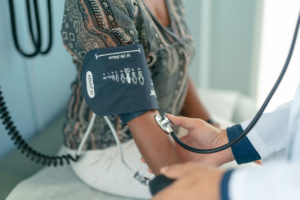Dubbed the “silent killer,” high blood pressure is something that can truly sneak up on you. It is not uncommon for people with high blood pressure to say that their condition came out of nowhere, and that they had no idea that they had a problem.
Also known as hypertension, high blood pressure rarely produces symptoms. However, the damage is ongoing – and if left untreated, it may lead to a heart attack or stroke. Many people who suffer a heart attack or stroke are only finding out about their hypertension after the incident.
Plus, many women tend to think of heart problems as being much more of an issue in men, but it is actually almost as prevalent among women. Among American women between the ages of 20 and 34, around 13% have hypertension. This figure dramatically rises to 86% by the time they reach their mid-70s.
What Is High Blood Pressure?
High blood pressure is the overly forceful pumping of the blood against the arterial walls. The arteries are the blood vessels that carry oxygen- and nutrient-rich blood from the heart to the rest of the body, and the veins are the vessels that take the depleted blood back to the heart. Blood pressure only measures the pressure in the arteries.
The blood pressure in people who have this condition reads over 130 systolic (pressure in arteries when the heart beats) and greater than 80 diastolic (pressure in arteries while the heart is at rest). This indicates that your heart is working too hard. The hypertension eventually damages your heart, brain, eyes, blood vessels, and other organs.
Risk Factors and Symptoms of Hypertension in Women
If you are female and have a family history of high blood pressure, and if you are overweight or menopausal, then you are at a greater risk of developing high blood pressure. Don’t wait for a stroke, heart attack, or heart failure before becoming proactive about your blood pressure and heart health.
There are very few who experience symptoms of high blood pressure. But among those who do, they report experiencing one or more of the following:
- Headaches
- Dizziness
- Blood spots in the eyes
- Facial flushing
- Nosebleeds
Treating High Blood Pressure
Fortunately, high blood pressure is highly treatable. You can take steps to lower your blood pressure, such as:
- Taking medication your family medicine provider may prescribe
- Increasing your physical activity
- Getting down to a normal weight
- Reducing your salt intake
- Quitting smoking
- Reducing your consumption of alcohol
- Managing your stress levels
Certain underlying health conditions can put you at an increased risk of developing high blood pressure. Diabetes, kidney disease, thyroid problems, and obstructive sleep apnea are known risk factors and should be properly managed or treated.
Primary Care Provider in Royal Palm Beach and Wellington
As part of your annual checkup, your primary care family medicine provider will take your blood pressure to check whether it’s normal or elevated. Although high blood pressure is very common, it need not be your reality.
Dr. Ishan Gunawardene is a trusted internal medicine family medicine provider providing superior primary care to his patients here in Palm Beach County. He can help you get your blood pressure under control and on the road to excellent heart health.
If you would like to schedule an appointment with Dr. Gunawardene, contact our friendly team today by calling us at (561) 434-1935, or request an appointment now by filling out our online form. We look forward to being your healthcare partner!


